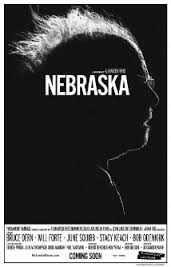We had to see it, and see it we did. It is King Lear in worn jeans with grease under the fingernails.
For plot details see the Internet Movie Database entry at http://www.imdb.com/title/tt1821549/
Or the official web site: http://www.nebraskamovie.co.uk

What I liked about it included, the wonderful cinematography that made the Sandhills seem almost alive in the background of the long drive.
But even better was the slow and steady camera survey of the ruined and wrecked Woody’s face in confusion, despair, determination, loss, repose, fatigue, purpose. Bruce Dern is center stage and mostly silent while the camera follows the emotions across his face.

Viewers may remember Bruce from ‘Coming Home” (1978) or ‘Silent Running (1972). If not, they should!
Having yielded reluctantly his kingdom to age, like Lear, Woody tries to reclaim it a little of it in that lottery scam.
One of his two sons, having nothing better to do makes the futile trip with him. During the drive this son, David, learns many things, some about himself and some about his irascible, volatile, not very loving or lovable father. And he meets many very nice people and a couple not so nice. Such is life.
David sees in Woody lost opportunities, mistakes, quiet achievements that no one knows about but his wife Kate, who wants to stomp Woody more often than not but destroys those others who might criticize or take advantage of him. All in all, it gives David a lot to think about in his own life, about 40, going grey, bunking alone in a motel room.
The other son, Ross, seems completely self-centred, and yet when he is needed, he is there. Capped with a marvelous scene when the two brothers momentarily return to their youth, communicating preternaturally, and off they go to get that damned air compressor. They learn next time not to take quite so literally what is said by someone diagnosed with Alzheimer’s.
Well, maybe not diagnosed, for when a well-meaning stranger asks David if Woody has Alzheimer’s he replies in the payoff line of the movie: ‘No, he just believes what people say to him.’ It is such a gem I thought, in my perfect hindsight it should have come later to cap it off.
The most powerful scene? Several come to mind, but none can beat Kate, Woody’s long suffering wife, when she bellows down the ravenous relatives who think Woody has indeed won the lottery. Jane Squibb as Kate blows their hair off, and the eyes of her two adult sons pop when she does.
I could not find an image of this scene, but here she is pensive.

But even more moving is the short drive down the street with Woody at the wheel of a new truck with an air compressor in the back. Redemption without a word.
Some critics, seeking always to be critical, which is usually translated as different if not perverse, suppose the director, writer, producer Alexander Payne is mocking the people who inhabit this story. I heard that a lot regarding his earlier movie ‘About Schmidt’ (2002) and let it go through to the keeper since the very assertion betrays an incomprehension so deep no remedy applies. It is a conclusion only a critic could draw.
This is not the country of Bill ‘The-Cheaper-the-Shot-the-Better’ Bryson.
Payne shows us a world, complete unto itself. It is light and dark, and within its confines, it has good and evil, too, but they shade into and out of each other. It is life.
I did not know Hollywood still made movies about real people, living real lives. It is a pleasure to see it is. Made by adults for adults.
I have no doubt that higher being Roger Ebert would put all thumbs up for this one.
Skip to content
